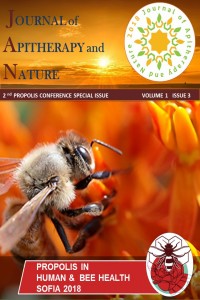Hepatoprotective Activity of Indonesian Stingless Bee Propolis Against Toxicity of Anti-tuberculosis Drug on Pulmonary Tb Patients
Öz
The usage of rifampicin,
isonoazid, pyrazinamide and ethambuthol to treat tuberculosis
(Tb) leads to hepatotoxicity which affects patient’s body weight
and nutritional status. Numerous studies have shown
propolis to act as a hepatoprotector. This study aimed to clinically evaluate the ability of propolis to protect the
liver from the toxic effects of anti tuberculosis drug
(ATD) and its impact on body weight and nutritional status changes of patients with pulmonary Tb. Randomized
clinical controlled trial, involving 50 subjects of lung Tb patients divided
into three groups: control (P0), propolis 1 supplementation (P1) and propolis 2 supplementation (P2); each subject
received intervention for 6 months. Biomarkers of liver toxicity; SGPT, SGOT,
BT, SOD and GSH were measured three times and body weight and nutritional
status were assessed weekly during treatment. Measurement of liver toxicity
biomarkers showed control groups experienced high liver oxidative damage during
the intensive treatment stage as characterized by
bilirubin exceeding normal values. In contrast, the
supplementation propolis groups showed no liver
oxidative damage as indicated by normal bilirubin
concentrations. P2 group showed excellent hepatoprotective activity as showed by the lowest bilirubin, the greatest
decrease of SGPT and the best antioxidant status of GSH and SOD enzymes. This
group also showed body weight and nutritional status increased from the beginning of the
intervention, while the other group decreased first. Pursuant to all
indicators, propolis 2 supplementation demonstrates liver protection from toxic
effects of OAT and prevents decreased body weight and nutritional status of
pulmonary Tb patients.
Anahtar Kelimeler
Kaynakça
- 1. Mahani, Sulaeman A, Anwar F, Damanik MRM, Hardinsyah, Ploeger A. 2018. Determination of Indonwsian native stingless bee propolis as complementary nutraceutical candidate of antituberculosis drug. Int J Pharm Pharm Sci 10 (4): 15-21 2. Mahani, Sulaeman A, Anwar F, Damanik MRM, Hardinsyah, Ploeger. 2018. Efficacy of Propolis Supplementation to Accelerate Healing Process and Body Weight Recovery of Pulmonary Tuberculosis Patients. J Gizi dan Pangan.
Öz
Kaynakça
- 1. Mahani, Sulaeman A, Anwar F, Damanik MRM, Hardinsyah, Ploeger A. 2018. Determination of Indonwsian native stingless bee propolis as complementary nutraceutical candidate of antituberculosis drug. Int J Pharm Pharm Sci 10 (4): 15-21 2. Mahani, Sulaeman A, Anwar F, Damanik MRM, Hardinsyah, Ploeger. 2018. Efficacy of Propolis Supplementation to Accelerate Healing Process and Body Weight Recovery of Pulmonary Tuberculosis Patients. J Gizi dan Pangan.
Ayrıntılar
| Birincil Dil | İngilizce |
|---|---|
| Bölüm | 2nd Propolis Conference Special Issue |
| Yazarlar | |
| Yayımlanma Tarihi | 8 Aralık 2018 |
| Yayımlandığı Sayı | Yıl 2018 Cilt: 1 Sayı: 3 - 2nd Propolis Conference Special Issue |
Kaynak Göster
ASOS Index

